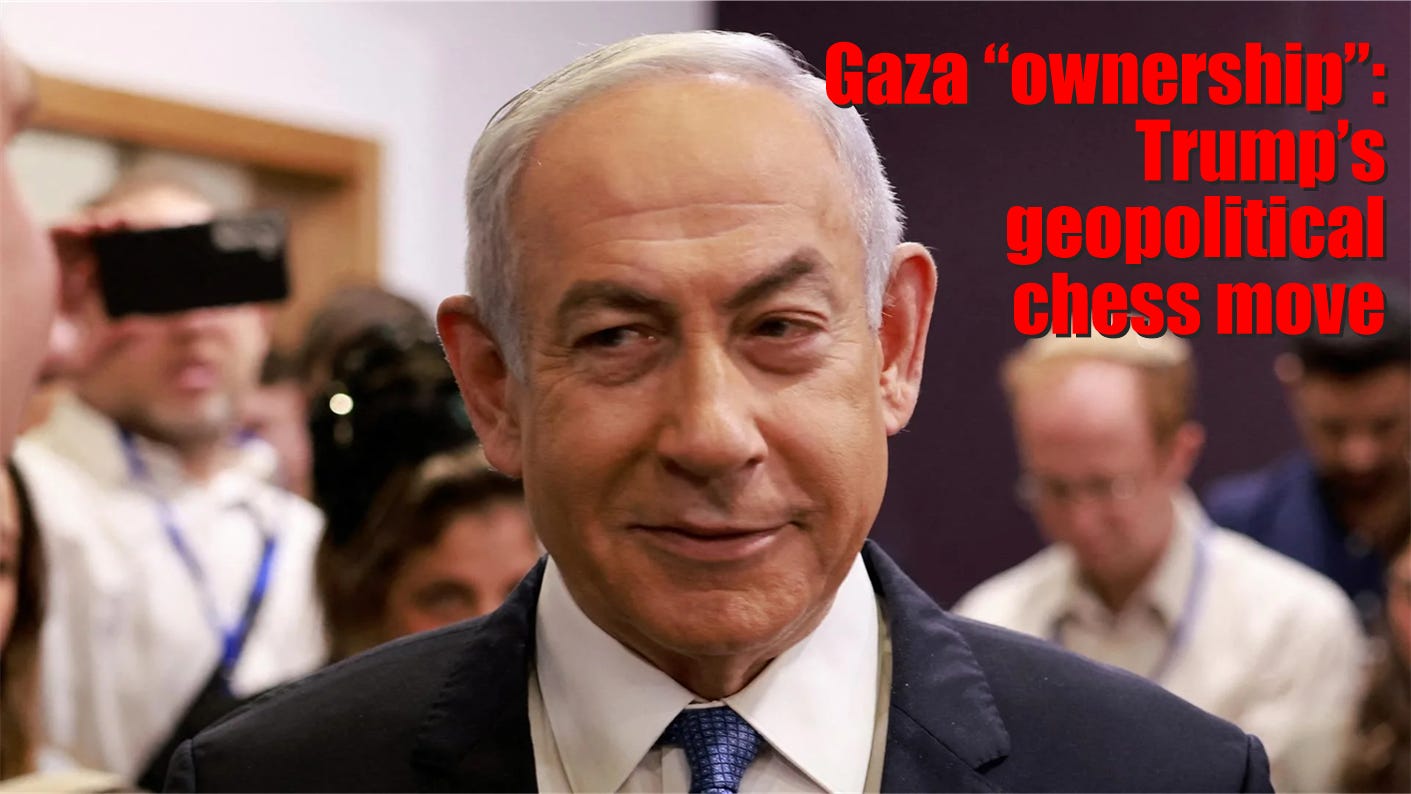Gaza ownership is Trump's geopolitical chess move
Key Markets report for Thursday, 6 February 2025
On Sunday, 2 February Israel's Prime Minister Benjamin Netanyahu flew to Washington for a working visit with Donald Trump. Trump had invited Netanyahu to Washington to discuss, "how we can bring peace to Israel and its neighbors, and efforts to counter our shared adversaries."
The announcements in their two press conferences (on 4 and 5 February) came as a shock to nearly everyone. Trump confirmed his intentions to displace the Palestinian population of Gaza, mainly to Jordan and Egypt. That much was known ahead of this week's meetings. But yesterday's announcement, that the US might take ownership of Gaza and rebuild it as some sort of a Mediterranean Riviera destination, came so far out of the blue, that it caught even the most learned geopolitical analysts by surprise, at a loss how to explain all this.
Many of them looked to Netanyahu's body language for clues, but there, the opinions varied widely. Some thought he looked smug and self-assured, implying that he felt in control of the situation. Others weren't so sure. I must say that during their sit-down conference on Tuesday, Netanyahu looked distinctly sheepish to me, grinning stupidly and looking around the room as Trump spoke. He did not appear self-assured to me. During yesterday's conference when Trump said that the US would take ownership of Gaza, it seemed as though Netanyahu was himself surprised by what Trump was stating.
Was this out-of-the-box brainstorming?
Either way, the announcement truly was shocking and surreal. The only way I can imagine such a move even being formulated is if it was the result of some brainstorming session in Trump's strategy team: How do we solve Gaza? "Hey boss, what if we simply take ownership of it? It's a nice area by the sea, good climate, etc... We could turn it into a premium resort area with hotels and golf courses... And it's got natural gas deposits just offshore, worth at least $4 or $5 billion..."
But this was also a geopolitical chess move: if the US claims ownership of Gaza, what does that do to Israel's superhawks? Will it make it easier or harder to justify sending IDF troops to fight and die there? Will Israeli settlers be able to take Gaza over and is this at all what was meant when God promised them this land? It is not so clear now and these questions will be extremely difficult for the religious zealots to ponder.
One of the effects of Trump's "shock announcement" will certainly be to trigger a reassessment of the US-Israeli relationship. In spite of the declared intentions, how far exactly do the two parties trust each other? I believe that US ownership of Gaza would pull the rug from under Israeli superhawks who want to go back to war in Gaza as soon as Hamas returns the last Israeli hostage. Netanyahu who, according to Haaretz, has endorsed Trump's plan may gain a bit of a political respite, but this will probably prove short-lived and recriminations will only escalate with charges that he sold Israel.
The Levant is complicated. Very, very complicated.
Then there's also the question of whether Trump even means what he announced? The idea of "owning" Gaza is hardly workable. Gaza's population might not want to leave. Both the Jordanian and Egyptian leadership made it clear that they won't allow the Palestinians of Gaza to settle in their countries.
Saudi Arabia is also opposed to the agenda. Trump certainly didn't clear his plans with the regional hegemons Turkey and Iran. The Turks are increasingly hostile to the US influence in the region, and a part of the Turkish political class has ambitions to reassert control over the whole historical extent of Palestine - Israel and Gaza included. Iran is still allied with Hezbollah and they continue to exert strong influence in the region.
The religious and sectarian balance of power in the Eastern Mediterranean is so delicate and the relations so complicated that rather than "taking ownership" of Palestine, last century the British Empire took a great deal of trouble to create Israel as a proxy force in the region. Even before Arthur Balfour drafted the 1917 "Balfour Declaration" and addressed it to Lord Walter Rothschild, the imperial establishment was making extensive plans to take control of the area.
In November 1915, the Manchester Guardian published an article in which the alumni of the so-called Milner's Kindergarten, also known as the Round Table explained that "the whole future of the British Empire as a Sea Empire" depended upon Palestine becoming a buffer state inhabited "by an intensely patriotic race." The reason they felt that an intensely patriotic race was needed there is precisely because the many forces present in the region would be hostile to an imperial outpost.
Given that this is obviously still the case today, it is hardly conceivable that Donald Trump and his team have illusions that they can "take ownership" of Gaza and enjoy it peacefully for real estate development, tourism and natural gas production without major and costly security arrangements that would almost certainly outweigh any benefits of ownership. That leaves us before a dilemma: are Trump and his advisors delusional, or are they simply trolling everyone? I am more inclined toward the latter.
Given that Zionist Jews and Christian Evangelicals constitute a powerful political force in the US, Trump would probably be cautious not to antagonize them and turn them into his enemies less than 3 weeks into his Presidency. At the same time, shocking the world with foreign policy crazy talk might also be useful as a distraction from the political clashes unfolding at the home front. Earlier today I joined Nima Alkorshid’s Dialogue Works podcast to discuss all these issues in more detail. The interview is below:
Hardly anything in the headlines makes sense these days and reading between the lines and in protagonists' body language makes it hard to interpret the unfolding events. We will only know for sure with the passage of time. At least as far as trading and investing is concerned, we have market trends to help orient ourselves in the markets and systematic trading strategies for decision support. The verdict, at this point, is that we should be long equities, metals and the US dollar and short treasuries, yen, euro and the British pound. Energy markets are still all over the place a bit, but the situation changes daily and our positioning will evolve with new trading signals.
To learn more about TrendCompass reports please check our main TrendCompass web page. We encourage you to also have a read through our TrendCompass User Manual page.
Trading signals for Key Markets, 6 Feb. 2025
With yesterday’s closing prices we have the following signals:
Keep reading with a 7-day free trial
Subscribe to I-System TrendCompass to keep reading this post and get 7 days of free access to the full post archives.






